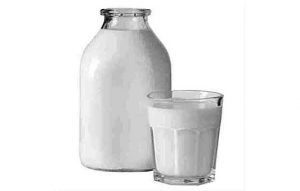
Latte
Enjoying full-fat milk, yogurt, cheese and butter is unlikely to send people to an early grave, according to new research by The University of Texas Health Science Center at Houston (UTHealth).
The study found that dairy fat, contrary to popular belief, does not increase risk of heart disease or overall mortality in older adults.
In fact, certain types of dairy fat may help guard against having a severe stroke, Marcia Otto, Ph.D., the study’s first and corresponding author and assistant professor in the Department of Epidemiology, Human Genetics and Environmental Sciences at UTHealth School of Public Health reported.
The study evaluated how multiple biomarkers of fatty acid present in dairy fat related to heart disease and all-cause mortality over a 22-year period.
This measurement methodology, as opposed to the more commonly used self-reported consumption, gave greater and more objective insight into the impact of long-term exposure to these fatty acids, according to the report.
Nearly 3,000 adults age 65 years and older were included in the study, which measured plasma levels of three different fatty acids found in dairy products at the beginning in 1992 and again at six and 13 years later.
None of the fatty acid types were significantly associated with total mortality.
In fact one type was linked to lower cardiovascular disease deaths.
People with higher fatty acid levels, suggesting higher consumption of whole-fat dairy products, had a 42 percent lower risk of dying from stroke.
The 2015-2020 Dietary Guidelines for Americans currently recommend serving fat-free or low-fat dairy, including milk, cheese, yogurt, and/or fortified soy beverages.
But Otto pointed out that low-fat dairy foods such as low-fat yogurt and chocolate milk often include high amounts of added sugars, which may lead to poor cardiovascular and metabolic health.
“Consistent with previous findings, our results highlight the need to revisit current dietary guidance on whole fat dairy foods, which are rich sources of nutrients such as calcium and potassium, essential for health not only during childhood but throughout life, particularly also in later years when undernourishment and conditions like osteoporosis are more common,” Otto said.
Evidence-based research is key to educating people about nutrition, Otto said.
“Consumers have been exposed to so much different and conflicting information about diet, particularly in relation to fats,” she said.
“It’s therefore important to have robust studies, so people can make more balanced and informed choices based on scientific fact rather than hearsay,” she added.
Dariush Mozaffarian, M.D., of the Friedman School of Nutrition Science and Policy at Tufts University, was senior author of the study, funded by the National Institutes of Health.
See also
Frequent low-fat dairy consumption may increase Parkinson’s disease risk (2017-06-19)
Link…
Effect of whole milk compared with skimmed milk on fasting blood lipids in healthy adults: a 3-week randomized crossover study
Link…
Mechanism of action of whole milk and its components on glycemic control in healthy young men (2014-10-29)
Link…
For more information
The American Journal of Clinical Nutrition
Serial measures of circulating biomarkers of dairy fat and total and cause-specific mortality in older adults: the Cardiovascular Health Study
Link…
University of Texas Health Science Center at Houston (UTHealth)
Link…
MDN
This post is also available in:
 Italian
Italian


